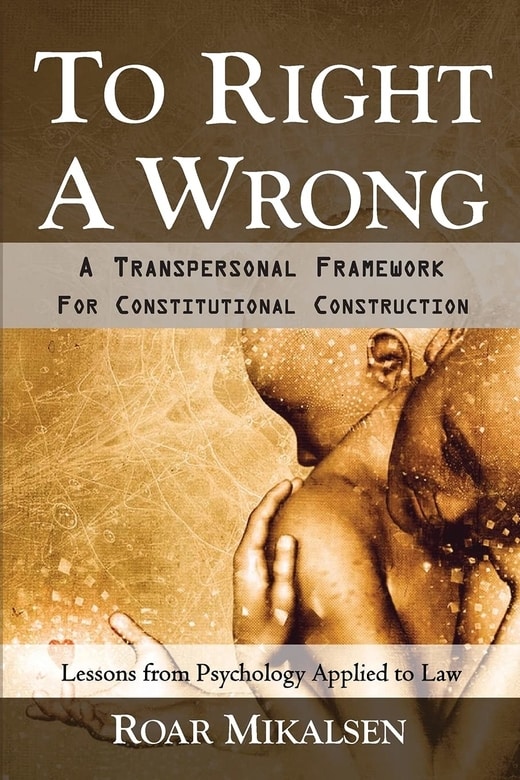Unleashing a torrent of evidence and critical analysis on the concept of constitutional law and our troubled relationship to it, To Right A Wrong: A Transpersonal Framework for Constitutional Construction by Roar Mikalsen is a captivating read, and a critical argument for our times.
From the very first page, readers understand that this will be a unique book, one focused on deconstructing the status quo from the foundations through logic and innovative viewpoints, and break down the accepted paradigms of American life. The psychological influence that leads us to collective living, political rule, and ultimately subjugation, is explored in accessible and enlightening ways, challenging readers to truly open their minds, rather than simply absorb densely packed information.
On the subject of law, specifically the bastardization it has undergone in American history, Mikalsen is an expert, and one might even say, an abolitionist. Mikalsen’s unabashedly critical second section, “The Idea and Destruction of America,” is a resounding argument against the “progress” the United States has made in terms of its application of principled law.
With scalpel-like precision, the author reveals the causes of legal corruption, and attempts to eviscerate any arguments to support the expansion of police powers. Given the relentless transition of America into a police state, this book feels incredibly timely and relevant, despite originally being written 5 years ago. If anything, the trends Mikalsen identified at the time of writing have continued, and worsened.
The zoomed-in attention this book gives to drug laws, specifically, reveals the author’s personal passion – the battle against prohibition. While the writing here is just as nuanced, well-researched, and intuitively ordered as the rest of the book, one can sense greater anger and emotion behind the arguments being presented. Dropping data points and knowledge that can’t be easily refuted is an excellent way to make a case, and Mikalsen does it well: “According to Duke and Gross, per 100,000 users, tobacco kills 650 people each year, alcohol 150, heroin 80, cocaine 4, and marijuana zero.”
Like great investigative journalists, the author doesn’t need to connect the dots or be heavy-handed with his readers, as the avalanche of evidence he presents means that people can see his perspective, and would struggle to refute it. Rounding out the book nicely, the final section returns to a more philosophical and psychological angle, once again challenging individuals to affect their broader communities and societies by arguing for a return to principled law, or else face the threat of totalitarian oppression.
On the editorial side of things, there are almost no errors to speak of, though there are some overly informal sections and turns of phrase that feel too casual for the book’s overall tone. Much of the exposition is conversational, but there is a limit to how subjective one’s arguments should be. The writing in the first and fourth sections, in particular, is thoughtful, patient, and encouraging – the author realizes that altering such a deeply rooted mindset in a population is no small task, but this revelatory book is a strong first step.
Book Links
STAR RATING
Design
Content
Editing
Get an Editorial Review | Get Amazon Sales & Reviews | Get Edited | Get Beta Readers | Enter the SPR Book Awards | Other Marketing Services























Thank you very much for your thoughtful words and excellent review. No greater happiness for an author than to find a reader❤️